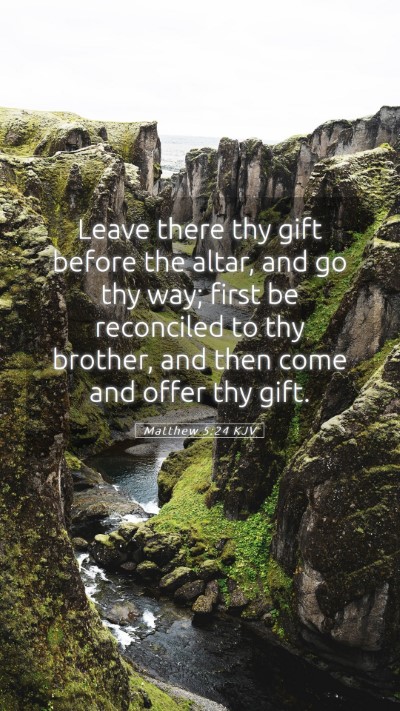Understanding Matthew 5:24
Bible Verse: Matthew 5:24 - "Leave your gift there before the altar and go. First be reconciled to your brother, and then come and offer your gift."
This verse comes from the Sermon on the Mount, where Jesus teaches about the importance of inner righteousness and relationships with others.
Overview of the Verse
Matthew 5:24 emphasizes the necessity of reconciliation with others before engaging in worship. It portrays a profound understanding of how personal relationships play a crucial role in one’s spiritual life.
Commentary Insights
-
Matthew Henry’s Commentary:
Matthew Henry highlights that this instruction of Jesus serves to underline the priority of love and harmony in relationships. He notes that external worship is rendered meaningless if one is harboring animosity or unresolved conflict with others. Henry emphasizes that true worship must stem from a heart free of discord.
-
Albert Barnes’ Commentary:
Albert Barnes points out that reconciliation is vital for believers. He interprets "your gift" as symbolizing acts of worship and suggests that approaching God requires us to be in a right relationship with our fellow man. Barnes indicates that the verse illustrates a principle that God's grace is conditional upon our willingness to forgive and reconcile.
-
Adam Clarke’s Commentary:
Adam Clarke delves into the cultural context of sacrificial offerings at the altar. He comments that Jesus' admonishment to leave the gift reflects a radical shift in how worship is perceived—placing human relationships above ritualistic practices. Clarke argues that the essence of worship is deeply rooted in one's moral obligations to fellow beings.
Bible Verse Meaning and Interpretations
This verse highlights several key theological and practical implications:
- Reconciliation is Foundational: True worship requires believers to ensure that they are not in conflict with others, emphasizing peace and forgiveness as central tenets of Christian faith.
- Priority in Worship: The act of worship should be approached after resolving disputes, symbolizing that God values relationships over ritual.
- Inner Condition Reflecting Outer Actions: The heart's condition must be aligned with actions; worship is not just about outward appearances of piety but an expression of love and respect towards others.
Practical Application
This verse can be relevant in various aspects of daily life and Christian practice:
- Conflict Resolution: It encourages believers to seek resolution in personal conflicts before participating in communal worship.
- Self-Examination: Believers are prompted to evaluate their relationships and the state of their hearts, ensuring that they embody the love and grace they seek in their worship of God.
- Promotion of Unity: It underscores the importance of community harmony as a prerequisite for genuine worship and relationship with God.
Related Bible Cross References
- Matthew 5:23: "So if you are offering your gift at the altar and there remember that your brother has something against you..."
- Ephesians 4:32: "Be kind to one another, tenderhearted, forgiving one another, as God in Christ forgave you."
- Colossians 3:13: "Bearing with one another and, if one has a complaint against another, forgiving each other; as the Lord has forgiven you, so you also must forgive."
Conclusion
In understanding Matthew 5:24, we see a profound call to prioritize relationships and reconciliation in our spiritual lives. The insights from public domain commentaries provide a deeper understanding of the necessity for inner purity that precedes outer religious acts. This passage challenges believers to reflect on their attitudes towards others, thereby integrating the biblical principle of love into everyday worship and interactions.
Additional Resources for Bible Study
For those seeking to delve deeper into the meaning of Bible verses, consider engaging with the following:
- Bible study groups focusing on interpersonal relationships.
- Online Bible study resources that include commentaries and historical context.
- Bible study guides on the Sermon on the Mount and its implications.


